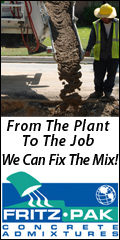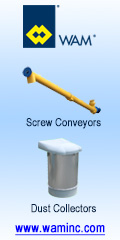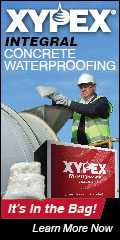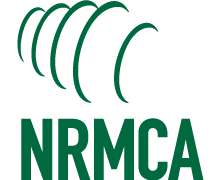
| Archive | Printer Friendly | Send to a Friend nrmca.org | E-Store | Conferences & Events | Certifications | InFocus | Membership Directory |
|
IN THIS ISSUE:
PAVEMENTS
ASSOCIATION & INDUSTRY NEWS
ENGINEERING
OPERATIONS, ENVIRONMENTAL, SAFETY & HR
SUSTAINABILITY
GOVERNMENT AFFAIRS
EDUCATION &TRAINING
PRODUCTS & SERVICES
CALENDAR
PAVEMENTS
Nathan Forrest, P.E. has been hired by the California Nevada Cement Association (CNCA) to promote paving in Southern California, but one of his first tasks was to travel to the Midwest and learn concrete paving promotion using the "immersion" method, reports NRMCA Senior Vice President, Local Paving, Jon Hansen.
"Experts say the best way to learn a new language is to be immersed into the country and its people," the Des Moines, IA-based Hansen said. "Tom Tietz is a firm believer in this training method as he sends his new hires to Iowa for a week where we show them things they are not likely to see in their areas. Things like integral curb and gutter, burlap and synthetic turf texturing, and un-reinforced pavement that stands the test of time. Nathan spent time with Gordon Smith and his staff of the Iowa Concrete Paving/Iowa Ready Mixed Concrete Associations' partnership and also visited the National Concrete Pavement Technology Center (CPTECH) in Ames."
"We also visited a large parking lot paving project under construction and I was able to arrange a meeting for Nathan with Dale Harrington, an author of many concrete paving documents and who is currently working with Caltrans on some overlay projects in the state of California in his role as a consultant at the CPTECH center," Hansen added. "A trip like this is a great opportunity for newly hired promoters in our industry to see examples of concrete paving first hand. We encourage other states and member companies to take advantage of this 'immersion' method of training." For more information contact Jon Hansen at jhansen@nrmca.org.
ASSOCIATION & INDUSTRY NEWS
The preliminary estimate of ready mixed concrete produced in September 2015 is 33 million cubic yards, 0.6% higher than September 2014. The production through September is estimated at 250.3 million cubic yards, 3.1% higher than that during the same period in 2014. Through the third quarter of 2015, 33 states record higher production levels than that in 2014.
Ready mixed concrete production is estimated from cement shipments reported by the U.S. Geological Survey. Details are available to NRMCA members here.
NRMCA member Vulcan Materials Company has announced what it calls the industry's first ready mixed concrete license with CarbonCure, a company whose technology uses carbon dioxide gas captured from the smokestacks of industrial emitters to improve the compressive strength of ready mixed concrete. The installation of the CarbonCure technology in Vulcan’s ready mixed concrete facility in Springfield, VA, means that Washington, DC, will be the world’s first metropolitan market with access to this sustainable concrete, according to a Vulcan media release.
"We at Vulcan are proud of our commitment to sustainability," stated Diggs Bishop, vice president/general manager for Vulcan's Mideast Division. "The CarbonCure technology, which improves both sustainability and strength, is the future of the concrete industry. We’re excited to announce that the future starts here, in Washington, D.C."
CarbonCure was founded in 2007. It states that its technology chemically repurposes waste carbon dioxide during the concrete manufacturing process. The company also provides reporting tools such as Environmental and Health Product Declarations for products made with CarbonCure.
For more information, contact Christie Gamble at cgamble@carboncure.com.
The American Concrete Institute will conduct a Webinar titled What's Trending in Concrete Pavement Construction on Wednesday, December 2, from 1 to 2 p.m. Eastern time. The overall objective of this Webinar is to acquaint participants with updated information contained in the recently published ACI 325-9R-15, Guide to Construction of Concrete Pavements; develop a better understanding of current and emerging construction practices, including slipform paving technology; appreciate sustainability issues that relate to concrete pavement construction; understand design assumptions that must be met in the construction process and understand how materials types and properties impact the construction process.
Click here for more information, pricing and registration options.
ENGINEERING
NRMCA Engineeering Staff attended the ACI Fall Convention held November 7-11 in Denver. Below is an update of some of activities that involved NRMCA representation:
130 – Sustainability Committee - Progress on the guide to concrete sustainability is slow, but the document will be ready to go for technical review by Spring 2016. Lionel Lemay will continue to monitor this committee to ensure ready mixed concrete’s interests are maintained and performance specifications and life cycle assessment, including work at MIT, are properly described and acknowledged. Lemay maintains NRMCA representation on ACI 130.
201 – Durability - The 201.2R Guide to Durable Concrete is being revised. ACI review comments are being addressed. After some discussion, the committee decided to recommend that the chloride limits should be based on percent by weight of cementitious materials, which is commonly used in other national codes. The committee will recommend that ACI 318 should change its chloride limits for concrete exposed to moisture limit to 0.15% from the current 0.3%. A task group (TG) is working on a tech note for recommendations as well as test methods for physical salt attack. Future sessions are planned on the following: 1. Sulfate Attack; 2. Freeze Thaw Resistant Concrete; 3. Advances in Test Methods to Evaluate AAR; 4. Electrical Methods to Evaluate Mass Transport. Karthik Obla maintains representation on ACI 201.
211 – Mixture Proportioning - The committee has completed several documents in the last 1 year – Proportioning with Ground Limestone and Mineral Fillers; Guide to Troubleshooting Concrete Mixtures and Guide for Selecting Proportions for Pumpable Concrete. Two new task groups are working on 3-point curves and aggregate packing models. The main 211 proportioning document is being revised with input from NRMCA. Karthik Obla maintains representation on ACI 211.
214 – Strength Tests - The committee is developing tech notes on two topics - strengths of cubes vs cylinders and use of two 4x8 in. concrete cylinders instead of three for acceptance. Karthik Obla is an associate member.
232 – Fly Ash - The committee decided to work on a tech note on Guide to Specifying Fly Ash for Concrete Performance. The committee had submitted the ACI 232.2R, Use of Fly Ash in Concrete document for ACI review. The document has been tentatively approved. Karthik Obla will address comments on the chapter on specifications, tests, and quality assurance. His committee is organizing a session to honor Tarun Naik for his contributions. Additional sessions are planned on the use of ponded ash and beneficiated fly ash. Karthik is the vice chairman of this committee.
240 – Natural Pozzolans - This new committee on natural pozzolans continues to discuss whether to expand its scope and consider other supplementary cementitious materials like ground glass, rice hull ash etc. which are strictly not natural pozzolans. The lack of a specification for these types of pozzolans was also discussed. Karthik Obla maintains representation on ACI 240.
301 – Specifications for Structural Concrete - Following a 90-day period for public comments, ACI Committee 301 spent two days of meeting time to address about 350 public comments. Most editorial comments will be accommodated and approved. Several comments suggested substantive revisions that could not be addressed at this time and many of these will be addressed in the next cycle. The committee did, however, make some substantive changes to the specification based on comments received. The committee will convene for a few Web-based meetings to finalize its resolutions; it is anticipated that the new version of ACI 301 will be published in Spring 2016. The publication of the document will result in disbanding the committee and a new committee will be formed for the next cycle before the next ACI Convention. Colin Lobo maintains representation on ACI 301.
318 – Building Code for Structural Concrete - The code chapters of interest to concrete producers are Chapter 19 that states requirements for concrete, including the durability provisions, and Chapter 26 that includes provisions that the designer needs to include in construction documents. ACI 318 Subcommittee A on concrete materials have change proposals on the following:
325 – Concrete Pavements - The committee currently has seven documents under development or revision. The report ACI 325.9R Guide for Construction of Concrete Pavements has been completely revised and has been published. The committee is also rewriting ACI 325.12R-02 (Reapproved 2014): Guide for Design of Jointed Concrete Pavements for Streets and Local Roads and is being lead by Brian Killingsworth. Revisions to this document will be completed this winter and balloted in the spring. The committee is developing ACI 325.XR Report on Precast Concrete Pavements - State of the Practice which is based upon work completed by Tayabji for SHRP2. The committee is also developing ACI 325.YR Proportioning, Quality Control and Evaluation of Concrete Pavement Strength Relationships. The document is complete and is being prepared for publishing by ACI after some TAC comments are resolved.
A revision is underway of ACI 325.11R Accelerated Techniques for Concrete Paving. Work is nearly complete and will be balloted in the next few months. Work is also underway to update ACI 325.ZR: Design and Construction of Continuously Reinforced Concrete Pavements over the next year. Lastly, ACI 325.13R-06: Concrete Overlays for Pavement Rehabilitation is being reviewed and updated. This work will continue over the next year. Killingsworth will ensure that considerations for streets and local roads will be included in all documents. He maintains representation on ACI 325. 327 – Roller-Compacted Concrete Pavements - ACI 327R-14 Report on Roller-Compacted Concrete Pavements was recently published by ACI. It is intended for this document to replace ACI 325.10R-95: Report on Roller-Compacted Concrete Pavements (Reapproved 2001) at some point in the near future. The committee has also initiated development of an RCC specification for materials and construction to supplement report 327R-14. Brian Killingsworth maintains representation on ACI 327.
329 – Performance Criteria for Ready Mixed Concrete - The committee has established task groups and leads to develop a "Guide to Writing a Performance-Based Specification". It is anticipated that initial sections will be developed in the near future. The MasterSpec format will be used for this document so that it can be effectively used by practicing engineers. The new chairman, David Tepke, is soliciting new members to contribute to this effort. The committee has also developed a presentation that discusses the goal of performance-based specifications and the content of its guide report. ACI 329R-14. The committee is co-sponsoring upcoming sessions on performance-based specifications – Forum 123 at the next convention; performance-based alternatives to water-cement ratio; self-consolidating concrete and case studies on projects using performance specifications. Colin Lobo (secretary) and Karthik Obla maintain representation on Committee 329.
330 – Parking Lots - The ACI 330 Committee is completing the ACI 330X Guide to Design and Construction of Industrial Pavements. The task group discussed and reviewed committee members’ responses to comments from the ACI review. Amanda Hult represents NRMCA on Committee 330.
ACI 332 – Residential Concrete - The guide to residential concrete has been balloted and all negatives resolved and will be sent for technical review in Spring 2016. Lionel Lemay represents NRMCA on ACI 332, but Amanda Hult will be the representative from Spring 2016.
365 – Service Life Prediction - This committee is balloting changes to its State of the Art document on Service Life Prediction. NRMCA has provided input. Several sessions are planned at upcoming conventions. Karthik Obla is an associate member of this committee.
522 – Pervious Concrete - This committee is working through revisions to the 522R document and the specification. A report was provided on the pervious concrete competition that took place at the convention (49 teams – mix design reports due out soon). Amanda Hult represents NRMCA on ACI 522.
555 – Recycled Materials - The document Removal and Reuse of Hardened Concrete is undergoing revisions and will include discussions on crushed returned concrete aggregates based on research work conducted at the NRMCA Research Laboratory. Use of recycled concrete aggregate as unbound base will also be discussed. The committee continues to organize many technical sessions on the use of recycled materials in concrete at each ACI convention; each of these sessions are very well attended which underscores the importance of this topic. Karthik Obla maintains representation on ACI 555.
601B – Concrete Quality Technical Manager Certification - ACI has developed a new Concrete Quality Technical Manager (CQTM) certification program. Additional requirements for an ASME Level III Concrete Inspector have been added. The program has been launched; as a result this committee is dissolved and a new committee C 690 will take over this certification in time for the ACI Spring 2016 convention.
Technical Session - Two technical sessions were held on chloride limits for concrete. The different recommendations/requirements in ACI documents was discussed; the range of threshold chloride concentration to initiate corrosion in various research studies was presented and the contradictory benefits with the use of supplementary cementitious materials in concrete was discussed. The intent of the session was to evaluate whether chloride limits could be stated on the basis of cementitious materials as opposed to on the basis of cement as in the current ACI standards and guide documents. Colin Lobo presented to provide an industry perspective on chloride limits and summarized an informal survey of the industry. ACI will publish a special publication (SP) of papers from these sessions.
For more information, contact Colin Lobo at clobo@nrmca.org. The recent NRMCA Concrete Technologist Training and Certification program (Technical Short Course) was attended and highly rated by 45 industry personnel. The following include the number of certifications awarded at the course. Attendees and personnel obtaining certification are congratulated for their participation and effort.
The next course is scheduled for February 8-12, 2016, in Des Moines, IA. The course is already half full, so interested persons should register soon. Information, registration links and staff contact for this Regional Short Course are available here.
NRMCA is offering its information packed one-day course, Handling Concrete Specifications, Low Strength Problems and Mixture Submittals, intended for concrete producers, contractors, engineers and testing labs on Wednesday, February 24 in Atlanta in association with the Georgia Ready Mixed Concrete Association and the Associated Builders and Contractors of Georgia, Inc. This one-day course will cover code and specification requirements (ACI 318, 301, ASTM C94) governing ready mixed concrete and address many other topics, including:
Course instructors are Luke Snell, P.E., FACI, FASCE, Western Technologies and Karthik Obla, Ph.D., P.E., NRMCA vice president, technical services. Producers, contractors, engineers and testing labs will find the discussions on investigating low strength problems and specifications very helpful in addressing issues that impact partnering, project cost and schedule. Upon successful completion of the course, attendees will earn 8 professional development hours, a certificate of completion and credits toward NRMCA’s STEPS program.
Click here for more information, including registration options and staff contact. NRMCA has scheduled its one-day course Improving Concrete Quality intended for concrete producers, ingredient material suppliers, engineers, testing labs and contractors for Tuesday, December 15, in Milwaukee. Improving Concrete Quality, a new book authored by one of the instructors, and other NRMCA resources provide the basic content for the course.
Improved concrete quality can benefit all stakeholders in a concrete construction project.This course will answer some of the following questions:
Course instructors are Kevin MacDonald, Ph.D., FACI, Beton Consulting Engineers LLC, and Karthik Obla, Ph.D., P.E. at NRMCA. Producers will learn readily implementable steps to manage variability and attain a more consistent product. Ingredient suppliers will learn how material variation affects concrete variation. Engineers will learn the opportunity for improving quality through specifications and testing lab professionals will learn to measure and improve testing quality. Upon successful completion of the course, attendees will earn 8 professional development hours, a certificate of completion and credits toward NRMCA’s STEPS program.
Click here for more information, registration options and staff contact. OPERATIONS, ENVIRONMENTAL, SAFETY & HR
The annual NRMCA Dispatcher Training Forum will be held January 13-15 in Orlando, FL. With the recovery happening, it's time to make sure experienced as well as neophyte schedulers and dispatchers are primed to make the order flow seamless. Since their work pressure is building again, they must be terrific at juggling competing demands at a much faster pace. New dispatchers often perform unevenly while under fire and even seasoned veterans can find it difficult to step back and change old habits. Put learning to work: attendees return ready to perform more efficiently in core skill areas:
• Putting Orders in Order: Mastering technical, practical and customer-service issues;
• Scheduling Success: Juggling priority customers, advance notices, callbacks, plant managers and sales reps, and a possible cement shortage;
• Technically Speaking: Knowing ASTM-C94 is vital to success;
• People Professionalism: Managing stress, phone skills and peers. Customers aren’t always right yet they must be served for their- and a producer’s benefit; and
• Details, details, details: Dealing with clean-ups, small load charges... the list goes on.
This class is highly interactive so your staff can try out new things in a safe environment, then "bring home the bacon" to your company.
Click here for more information, registration options and staff contact.
SUSTAINABILITY
After years of urging by NRMCA and other key stakeholder groups, USGBC has adopted LEED pilot credits that provided incentives for design teams to plan, design and build for resilience. NRMCA proposed a pilot credit in September 2013 and was connected with another group headed by Alex Wilson of the Resilient Design Institute, a longtime resiliency advocate who had submitted a pilot credit with similar goals. Through collaboration, the Alex Wilson group adopted some of the key parts in the NRMCA proposal, specifically dealing with hazard identification and design criteria in the FORTIFIED for Safer Business program. The three credits are:
1. Assessment and Planning for Resilience: In this credit, the design team must complete in pre-design a Hazard Assessment prerequisite to identify critical hazards plus at least one of two options of either Climate Resilience Planning or Emergency Preparedness Planning (1 Point). Click here for details.
2. Design for Enhanced Resilience: In this credit, the design team must design their project to specific design standards (including FORTIFIED for Safer Business) for the top three hazards identified in the Assessment and Planning for Resilience credit (1 Point). Click here for more details.
3. Passive Survivability and Functionality During Emergencies: In this credit, the design team must meet any two of the three options that include thermal resilience (livable conditions in a building after a disaster), back-up power or access to potable water (1 point). Click here for more details.
Although these credits only count for a single point each in LEED, this is typical for pilot credits. Once a pilot credit is implemented and vetted on actual LEED projects, they are often implemented as permanent credits and points assigned based on their overall impact regarding green building objectives which means points assigned to each credit could be increased.
For more information, contact NRMCA's Tien Peng at TPeng@nrmca.org or Lionel Lemay of NRMCA at LLemay@nrmca.org.
GOVERNMENT AFFAIRS
Media articles on Congress, transportation infrastructure, regulation, taxes and other subjects, each of which relate to the ready mixed concrete industry, are updated each week by NRMCA's Government Affairs staff. To access the most recent compilation of articles for November 9 - 13, 2015, please click here.
If you would like to receive this weekly updated link in a separate e-mail, or if you have questions or comments about the roundup, contact NRMCA’s Jill Landry at jlandry@nrmca.org.
Members of the House and Senate transportation "conference committee" will meet this week to reconcile each chamber's version of the multi-year surface transportation reauthorization bill known as the DRIVE Act. Even though the meeting is more procedural in nature, conference committee staff have already begun working behind the scenes to hash out differences between the two bills. This expedited process will hopefully enable Congress to pass a final bill for President Obama’s signature into law immediately following the Thanksgiving holiday.
The current extension for Highway Trust Fund authority expires on Friday, November 20, making another short-term extension certain. To avoid a shutdown of highway programs, the House passed by voice vote on Monday another two-week extension of highway and transit authority through Friday, December 4.
Funding levels and agreement on the pay-fors in the bill are still under negotiations. The Senate bill provides six years of authorization, but with only three years of funding. The House agreed to accept most of the Senate pay-fors and added another 40 billion in funding by tapping into the Federal Reserve capital surplus. If all of the pay-fors are agreed to, then the final surface transportation reauthorization would have enough funding for a five or six-year bill depending on the exact levels of funding.
NRMCA had joined the Transportation Construction Coalition in a letter to House and Senate leadership asking for increased spending levels in the final bill even if that means a shortening the length of the bill. NRMCA also joined the Highway Materials Group in sending a letter to House and Senate conferees requesting that our industry’s top legislative priorities be preserves in conference.
For more information, contact Kerri Leininger at kleininger@nrmca.org.
EDUCATION &TRAINING
NRMCA’s most popular Webinar for sales managers will take place on Tuesday, December 15, from noon to 1:30 p.m. Eastern time. As the end-of-year evaluation become a reality, learn how to ascertain if your sales reps’ performance are at the top of his/her game... and, if not, how you can help them. Learn how to identify the specific barriers that could be holding them back and how to create a personal coaching and motivation strategy to improve performance during 2016.
Click here for more information and registration options.
PRODUCTS & SERVICES
The NRMCA November Internet Spotlight, which will be good through Tuesday, December 1, feature two of NRMCA’s best selling publications:
Updated in 2015, the ASTM Standards for Ready-Mixed Concrete, 6th Edition has 38 current ASTM standards and includes 20 newly updated standards. This compilation is relevant to other methods of producing concrete, such as precast and site mixed concrete. It represents the latest information in the industry and is a valuable resource and essential reference for users of C94 and C685, specifiers, engineers, architects, contractors, builders, testing laboratories, concrete material suppliers, concrete producers and students. 260 pages; published in 2015.
By special arrangement with ASTM International, this publication is available only to NRMCA members at a considerable discount from the ASTM list price. Member price for up to 9 copies is $120; 10 or more are $110, plus shipping. Now bigger and better, the Mixer Truck Driver's Manual educates truck mixer drivers about concrete and customer relations. It also highlights driver duties, safety precautions, equipment inspection and maintenance procedures, and what the driver should do in case of an accident. This 74-page manual is easy to understand and contains common sense information every driver should know.
Order online today and receive 15% off. Regular member price is $16, Internet Special is $13.60, plus shipping. Use discount code: ISNOV15. CALENDAR
*Please note that e-mail and direct links to each event listed below can be accessed from NRMCA's Web site.
December 1 - 3, Orlando, FL
Environmental Course
Email: Jessica Walgenbach, 888-84-NRMCA, x1152
December 1 - 3, Silver Spring, MD
CCSP Module II: Customer Business Knowledge
Email: Jessica Walgenbach, 888-84-NRMCA, x1152
December 4, Nashville, TN
Pervious Concrete Contractor Certification Course (Tennessee Concrete Association)
Email: Mrs. Darla Sparkman
December 8 - 11, Orlando, FL *Sold Out
Plant Manager Certification Course
Email: Jessica Walgenbach, 888-84-NRMCA, x1152
December 15, Milwaukee
Improving Concrete Quality
Email: Jessica Walgenbach, 888-84-NRMCA, x1152
December 15, Webinar
Sales Management: Sales Performance Assessments and Reviews
Email: Jessica Walgenbach, 888-84-NRMCA, x1152
2016
January 13 - 15, Orlando, FL
Dispatcher Training Forum
Email: Jessica Walgenbach, 888-84-NRMCA, x1152
January 26 - 29, Omaha, NE
Plant Manager Certification Course
Email: Jessica Walgenbach, 888-84-NRMCA, x1152
January 27, Free Webinar
Performance–Based Specifications
Email: Jessica Walgenbach, 888-84-NRMCA, x1152
February 8 - 12, Des Moines, IA
Regional Concrete Technologist Training and Certification Course "Short Course"
Email: Karen Bean, 240-485-1168
February 23 - 25, Silver Spring, MD
CCSP Module III: General Business Knowledge
Email: Jessica Walgenbach, 888-84-NRMCA, x1152
February 23 - 26, Honolulu
Plant Manager Certification Course
Email: Jessica Walgenbach, 888-84-NRMCA, x1152
February 24, Atlanta
Handling Concrete Specifications
Email: Jessica Walgenbach, 888-84-NRMCA, x1152
March 13 - 15, San Diego
NRMCA's Annual Convention
Email: Jessica Walgenbach, 888-84-NRMCA, x1152
March 22 - 24, Silver Spring, MD
CCSP Module IV: Professional Sales Skills
Email: Jessica Walgenbach, 888-84-NRMCA, x1152
April 5 - 8, Birmingham, AL
Plant Manager Certification Course
Email: Jessica Walgenbach, 888-84-NRMCA, x1152
May 15 - 18, Washington, DC
International Concrete Sustainability & Self-Compacting Concrete Conference
Email: Lionel Lemay, 847-918-7101
|
November 18, 2015
|
|












